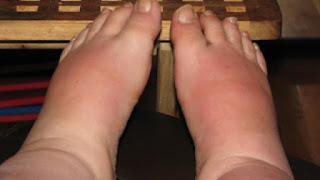Swollen Feet and Ankles Causes in Men and Women

Looking for swollen feet and ankles causes? Many health-related issues come out if we put a glance at anyone’s feet. A healthy foot always shows a healthy lifestyle. Still, individuals with swollen feet and ankles must have a list of health-related issues like obesity or any serious underlying health condition that needs immediate medical attention.
So here we are to discuss the factors that make your feet swell easy to treat from the very beginning.
In medical terms, swelling is known as Edema. It occurs when any of our body parts get any injury. Due to muscle rupture, the injured area starts to swell or get inflamed. Moreover, swelling can happen due to excess build-up of fluid in any specific area.
Leg or foot swelling is caused due to excess fluid deposition. It is also known as peripheral Edema, when leg swelling happens when leg tissue retains fluid due to various reasons, such as kidney problems or blood circulation problems, or issues in the lymphatic system.
On the other hand, leg swelling or fluid build-up in the leg tissue may be caused by overweight, lack of physical activities, standing on your feet for long hours, etc.
Swollen Feet and Ankles Causes

1. Chronic Renal Problem
Chronic kidney problems or CKD is one of the reasons that your feet are swelling. The kidney plays an integral role in blood filtration and many other physiological works. Such as—
- It helps to maintain the balance of minerals and electrolytes in the blood.
- Boost up RBC production.
- It helps to excrete water-soluble wastes.
Therefore, when the kidney fails to perform its work, the water balance and excretion system become upset. Our body could not flush out the fluid. As a result, fluid builds up in the legs and other parts of our body.
Also Read: 8 most common bad habits that damage your kidneys
2. Lymphedema
Lymphedema is one of the reasons for swelling that occurs in the leg. The most common cause of Lymphedema is when the lymph nodes get damaged or removed as a part of the treatment procedure of cancer; the unwanted substances of our body carry outside through the lymphatic system.
Therefore when the lymph vessels get damaged or removed from the body, the toxic fluid deposits in the arms or legs. The common symptoms of Lymphedema are various. Such as:
- The problem is leg movement.
- The skin becomes thicker in the toe area.
- Individuals who are undergoing radiotherapy or lymph node removal operation have got a higher risk of Lymphedema.
3. Swelling due to Blood Clots
Insufficient blood flow to any parts, especially in the deep veins in the legs. Often in medical terms, we call it a deep vein or thrombosis or DVT that obstructs blood flow in the swelled area. The blood platelets stick together.
In such cases, a blood clot in the leg region’s veins obstructs the blood circulation in the opposite direction. Thus prevent the blood from moving back to the heart. As a result, the ankle and feet develop swelling.
Related: Only a Glass of This Juice will Remove Clogged Arteries
4. Due to a Side Effect of Medicine
Often we have to take a variety of medicines for a long time, some of which are responsible for water retention.
Therefore, if anyone is undergoing such meditation, feet swellings are a common occurrence in that case. Let us check the type of medicines—
- Medicine used in hormone replacement therapy.
- Specific calcium channel blockers help relax the blood vessel and improve blood and oxygen supply to the heart.
- Androgenic or anabolic type of steroids and corticosteroids.
- Medicine is used to treat depression.
- Medicine used for diabetes.
- If anyone is experiencing foot swelling due to medication, immediately call the doctor for any change in dose or types.
5. Alcohol
Swollen feet from alcohol: Leg swelling is very common. Who has the regular habit of drinking alcoholic beverages like beer, wine, whiskey, etc.? Alcohol seriously affects the excretory system and creates an impact on the filtering ability of our body.
When any alcoholic substance enters into our blood vessels, it forcibly puts an end to the release of antidiuretic hormone. As a result, our kidney contributes to losing water quickly, and it causes frequent urges to urinate.
With alcohol, the water level of our body increases, and the excess fluid build up in the leg or under the eye area.
For an occasional drunker, the swelling due to alcohol heal by itself by a couple of days, but it can cause a serious health issue for a heavy drinker.
6. Sedentary Lifestyle
Individuals who lead a sedentary lifestyle tend to develop a swelling foot. It has often been noticed that we feel the heaviness of fat after we sit for long hours on a chair, keeping our legs hanging downwards.
Besides this, lack of physical activity or movement can cause such type of swelling.
People leading a sedentary lifestyle often sit or stand or lie down while watching television or reading books, using a computer or mobile phone.
These activities negatively influence and increase the risk of various sicknesses and enhance the chance of leg swelling.
Also Read: 9 Instant Home Remedies for High Blood Pressure
7. Varicose Vein
Varicose vein or varicosities is a common reason for foot swelling, and it occurs when leg veins get enlarged, disabled, and chocked with blood.
The affected area becomes bluish-purple, and it is equally painful. A varicose vein is the result of improper vein function.
Usually, veins carry impure blood back to the heart, but if anyone gets a damaged vein, the blood begins to deposit in the vein, and they enlarge. There are a few potential reasons to develop varicose vein area—
- Pregnancy.
- Aged over 55.
- Standing for a long period.
- Menopause.
8. Pregnancy
Pregnancy brings various changes and discomforts and leg swelling, which is one of the most common problems among them.
Usually, during pregnancy, the body tends to retain more water than the normal condition, and this causes the body fluids.
It has been noticed that Swollen Feet and Ankles occur in the evening, after walking or standing on the feet all over the day.
Not only that, but also the changes in specific hormone levels in the growing uterus put excess pressure on the blood vessels that carry blood towards the leg. To avoid such a situation, a pregnant woman should do the following—
- Do not stand or sit in the same posture for a long time.
- Put your feet a little higher while resting.
- Avoid tight clothes
- Reduce salt intake.
9. Infection
Infection can lead to swelling as it is associated with inflammation, redness, and pain. Feet swelling can occur when anyone has developed an ingrown toenail or any other type of Neil infection.
Diabetic patients also experience swelling due to the wound in the leg or the toe area.
Swollen Feet and Ankles are also common for people with damaged nerves holding old age. Moreover, there are other ways that anyone can get swelling from an infection, such as insect bites, severe types of athlete’s foot, etc.
10. Arthritis
Arthritis is a painful condition that causes local swelling and joint pain in the foot or leg joint.
The most common form of arthritis is osteoarthritis when occasional swelling occurs. Still, gout is a typical form of arthritis that causes severe pain, redness, and swelling of the big toe joints. It can also affect the ankle area.
Some types of foot swelling are caused by autoimmune diseases like rheumatoid arthritis, psoriatic arthritis, etc., that can affect both feet equally. Swelling and stiffness of joints and pain are some of the problems caused by different forms of arthritis.
Conclusion
So, in conclusion, we would like to add that feet swelling can occur due to various reasons. Therefore observing it from the very beginning is important to find out the exact cause.
Very often, it is cured by some home remedies or by some changes in lifestyle. But if it does not go away within a few days, consulting a doctor is a must as there might have some serious underlying health issues.
So, friends, we hope that going through the above swollen feet and ankles causes will surely help you.





